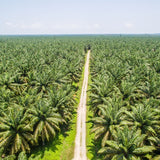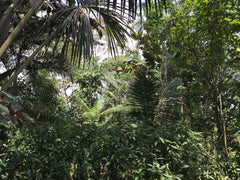Palm oil and gluten-free
Palm oil is the globally most used vegetable oil in the world. Current demands for the product cannot fulfill sustainably. As a result, we are suffering a massive loss of habitat, loss or displacement of wildlife, human rights violations, and intensifying effects of climate change. The global palm demand is incredibly high due to its versatility as an ingredient and low price: more than 50% of supermarket stocks and 95% of bath products contain palm oil.



Deforestation will decisively accelerate climate change since tropical forests play an essential role in the water cycle and provide a crucial air cleaning service e and sequester carbon. Species losing their habitat due to the rapid expansion of palm oil and land use can negatively affect water resources and increase greenhouse gases.
Palm oil-producing trees also cover fertile land used by local communities to grow essential and valuable food crops. Local farmers in palm-producing regions often, and understandably, succumb to pressure to support their families, cutting and burning critically important ancient tropical forests plant monoculture palm plantations.
The refusal result would likely be that they will be forced to abandon their lands and that the rain forests are lost one way or another. The absence of fair prices paid by the large multinationals that buy the oil exacerbates the problem. Farmers are often poorly paid and have to cut, burn and plant even more to earn a living and are often forced to work in unsafe conditions. The whole system generates dependence on large corporations that will move on to other areas as soon as this one is no longer profitable.
Due to the versatility of palm oil and the growth of the human population, demand will inevitably continue to increase, putting more pressure on natural ecosystems. We must find sustainable alternatives to allow tropical regions to restore and prosper.
Is there a sustainable version?
The unfortunate irony is that palm is the most efficient oil on the planet to produce. Compared to coconut palms, only 25% of the land and water are required to produce 1 liter of palm oil, compared to 1 liter of coconut oil.
Sustainable palm production is the best way forward, but it is a considerable challenge. It is almost impossible to separate sustainable from unsustainable palm, and existing standards do not prohibit deforestation or the hugely problematic development of palm plantations.
The Roundtable on Sustainable Palm Oil (RSPO) is working to resolve the adverse effects of palm oil production, working to unite those operating in the industry by developing criteria for companies that want to be considered sustainable palm oil users. With certification to prove that the palm oil industry, producers, traders, and non-governmental organizations (NGOs), investors, and partners make palm oil more sustainable.
This organization has developed a set of certification standards for sustainable palm oil and currently has more than 30,000 members.
Establishing certification standards is to guide palm oil producers towards a more responsible business operation and more sustainable palm oil production. Due to the consumers increased awareness of the adverse effects of palm oil production, companies are now publishing annual palm oil progress reports as part of their commitment to sustainability to be accountable to different stakeholders.
There is no denying this progress and the possibilities for companies to reduce their impact if sustainable palm becomes a viable option. However, as things stand today, there is also no denying the massive damage the industry still has on people, animals, and the environment. It may be cheaper, but at Bekoherent®, we will not participate until this is resolved and tested.
And why are we gluten-free?
First of all, let's start by clarifying what gluten is; Gluten is a set of small proteins present in some cereals, such as wheat, barley, rye, and oats. It is composed of Gliadin and Glutenin.
The world of celiacs is loaded with restrictions concerning gluten. While it is true that we always associate these limitations with food, we must expand our perspective on the world of beauty and personal care.
Gluten has a high molecular weight, and for this reason, the scientific community seems to have a consensus when it comes to stating that it cannot be absorbed by whole skin and therefore could not harm by not passing into the bloodstream. However, some caveats should be researched about the use of cosmetic products.

